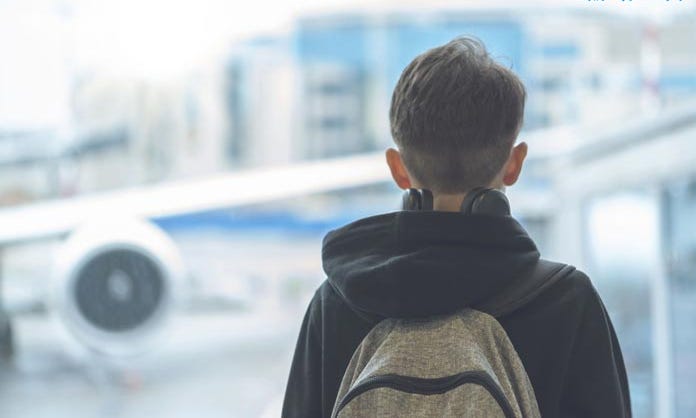The Placeless Humans
I started crying and asked them to let at least me call my sister, but the driver yelled at me to be quiet and said that everyone in the van was going to be deported back to Afghanistan
According to Mohajir Times, quoting Sharq Daily—Nasrin Farrokh, Social Journalist: The sound of Sayed Mahdi’s cries echoed through the alley as passersby gathered around the police car, watching an officer harshly shouting at a deaf teenager. Amidst tears, Mahdi Mousavi pleaded, “Uncle, let me go,” just as his mother, clad in a black chador, rushed to her son’s side, imploring, “Have a mercy.” The officer dispersed the mother and other bystanders before forcing Mahdi into the car, where another bewildered child sat. According to Mahdi’s brother, that same day, Mahdi’s hearing aid, which had been obtained with great effort, was destroyed in the commotion. This incident, captured in a video of the treatment of the Afghan teenager, has been widely shared on social media, drawing attention to the increasingly complex issue of the treatment of foreign nationals in Iran. Despite claims by many activists that deporting unaccompanied minors under 18 and women is illegal, such events continue to occur. For instance, as reported by Shargh, Amir Ali, another Afghan teenager with valid residency documents, was arrested a few days ago for deportation, during which his shoulder was injured.
“I Said I Have Residency Documents, But No One Listened.”
Amir Ali had eagerly gone to get his PlayStation repaired when the police stopped at the intersection with a van, ready to pick up anyone they identified as Afghan. Despite having residency documents and being a student at a school in southwest Tehran, Amir Ali was terrified by the aggressive approach and fled from the Sadaf intersection in Tehran’s Tehran Pars neighborhood into the surrounding alleys. The officers caught up with him, snatched his beloved PlayStation, threw it into the street, and forced him into the van. The struggle caused a severe injury to his right shoulder, requiring a doctor’s visit the following Saturday. This is part of the story of 15-year-old Amir Ali, a well-spoken teenager who lives with his sister and grandmother. He vividly recounts every detail of his experience and shows a remarkable writing talent.
In a four-page letter written with clear and eloquent language, Amir Ali narrates his ordeal, which he later described in even greater detail during a verbal interview with Shargh Daily. He had gone to the Sadaf intersection in Tehran pars to repair his gaming console when he noticed a commotion and realized that a van with several officers had arrived to arrest foreign nationals. “I was terrified. The officers were even putting children into the truck. I heard some Afghans shouting that they had documents, but the officers ignored them and took everyone. That’s why I got scared. I thought that if they took everyone without asking for documents, they would soon come for me, too. Just then, I saw one of the officers running towards me. I was so scared. The sight of someone coming to arrest me made my body move on its own, and I started running. I knew the officer was still chasing me, and since it was early in the morning, the streets and alleys were quiet and empty. But even the people I asked for help didn’t do anything...
I ran until I reached the end of the alley near my house. That’s when someone grabbed me tightly from behind—it was that same officer. The van and a motorcycle arrived right then. No matter how much I asked why they were treating me this way and arresting me, no one gave me a clear answer. They threw my console box across the street and put me in the van... I started crying and asked them to let at least me call my sister, but the driver yelled at me to be quiet and said that everyone in the van was going to be deported back to Afghanistan. I told them that I was a student and that my mother is an Iranian, and asked them to let me call my family to bring my documents. I don’t have anyone in Afghanistan at all. But the driver harshly said, ‘That’s none of my business. Wait until we get to the police station, then you can call...’
When we arrived at the police station, they handcuffed all of us together and kept us in the yard. A few minutes later, one of the officers told us that anyone with identity documents should call their family to bring their residency papers and get released. They told me I needed to be transferred to Police Station 151 in Yaftabad, and if my family was late, I would be taken to the Askarabad-e-Varamin migrants camp and then deported directly from there. After I made the call, even though my family was on their way to the Tehran Pars police station, they loaded us into the van and drove to Yaftabad. When we got to the second police station, families started arriving gradually. Some of those detained were even younger than me. Eventually, my sister handed over the documents, and they released me, but at that moment, they said the documents were expired. A few officers dragged me back towards the van while my sister held onto my hand, but they pushed her away.
No matter how much I explained that I’m a student, I go to school, my mother is Iranian, and I have no one in Afghanistan, it made no difference. My sister held onto me, and I was begging, swearing that besides my sister and grandmother, I have no one else, and they are both here in Iran. This created a lot of noise. Some officers tried to pull my sister away so she would let go of my hand. The officers were dragging me towards the bus while my sister pulled me towards her... That’s when the officers forcefully yanked my hand, causing me to fall hard on my shoulder, which later turned out to be fractured. At that moment, my sister told me to run away, and I managed to escape...”
Increasing Deportation of Underage Children
“Sima Sadr,” a social worker and activist for this family, also refers to Amir Ali’s case and speaks of many other instances where Afghan teenagers aged 10 to 17, despite having adequate documents, are arrested for deportation. She tells Shargh, “A few days ago, when one of our 15-year-old boys was outside, the police stopped him, assuming he was Afghan, and intended to send him to a camp for deportation. This boy was born to an Iranian mother and an Afghan father, so he is technically Iranian and has no one in Afghanistan. We’ve even been trying to get him an Iranian citizenship, but due to the complexities of obtaining citizenship, we haven’t succeeded. No matter how much the boy said he was Iranian, no one would listen. This is happening to many of our boys under 18, especially the younger ones. This is not the first time that underage children are sent to camps for deportation without checking their identity documents. Pakdasht is a migrant-populated area, and over the past six months, I’ve heard many similar stories about boys aged 10 to 17.”
All of This Is Illegal
During this period, many Afghans, even those with residency documents, have been arrested for deportation, such as Kobra Gholami, a student and researcher whose case caused quite a stir. Now, there is also a video of Sayed Mahdi, a partially deaf teenager, being arrested by the police while his mother pleads, “My son is deaf,” urging the police to let him go. “Reza Shafakhah,” a legal activist and senior lawyer, in an interview with Shargh, points to the detention of minors, the treatment during detention, and the policies that have led to an increase in the number of foreign nationals in Iran, stating, “None of these actions comply with the laws of the Islamic Republic or the conventions we have signed. When we talk about legal issues, some people assume that child rights activists are sentimental individuals without knowledge or expertise who believe that the borders should be open and all migrants should enter Iran, but such an approach doesn’t exist among legal activists at all.
Even in dealing with undocumented migrants, it should be done within the framework of the refugee conventions and domestic laws. For example, like in other countries, each refugee’s case should be handled in a third-party court, where the refugee has the right to have a lawyer and appeal the court’s decision—not for the police to pick up anyone at the street corners, whether they have documents or not, and take them directly to a camp for deportation. Therefore, the police should not act independently in arresting these individuals. Also, according to all laws, deportation of unaccompanied minors under 18 is prohibited. Even if deportation is ordered, which must be done through a court ruling, it should be carried out with their family.
On the other hand, the police have no right to assault any human being, especially by kneeling on a deaf child’s neck. These actions are all illegal. But what we are seeing in the streets these days is that whether refugees have documents or not, they are being deported.”






